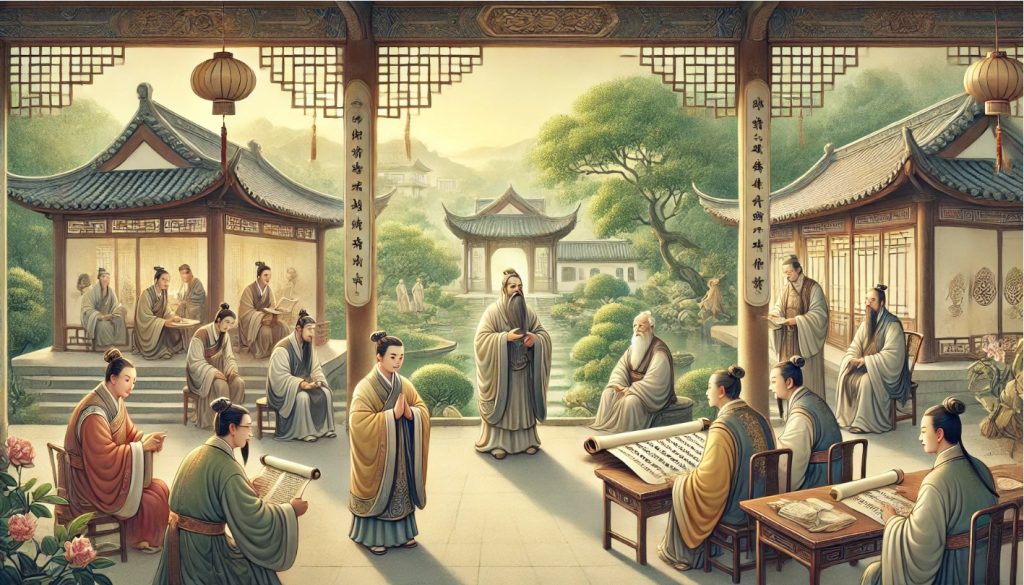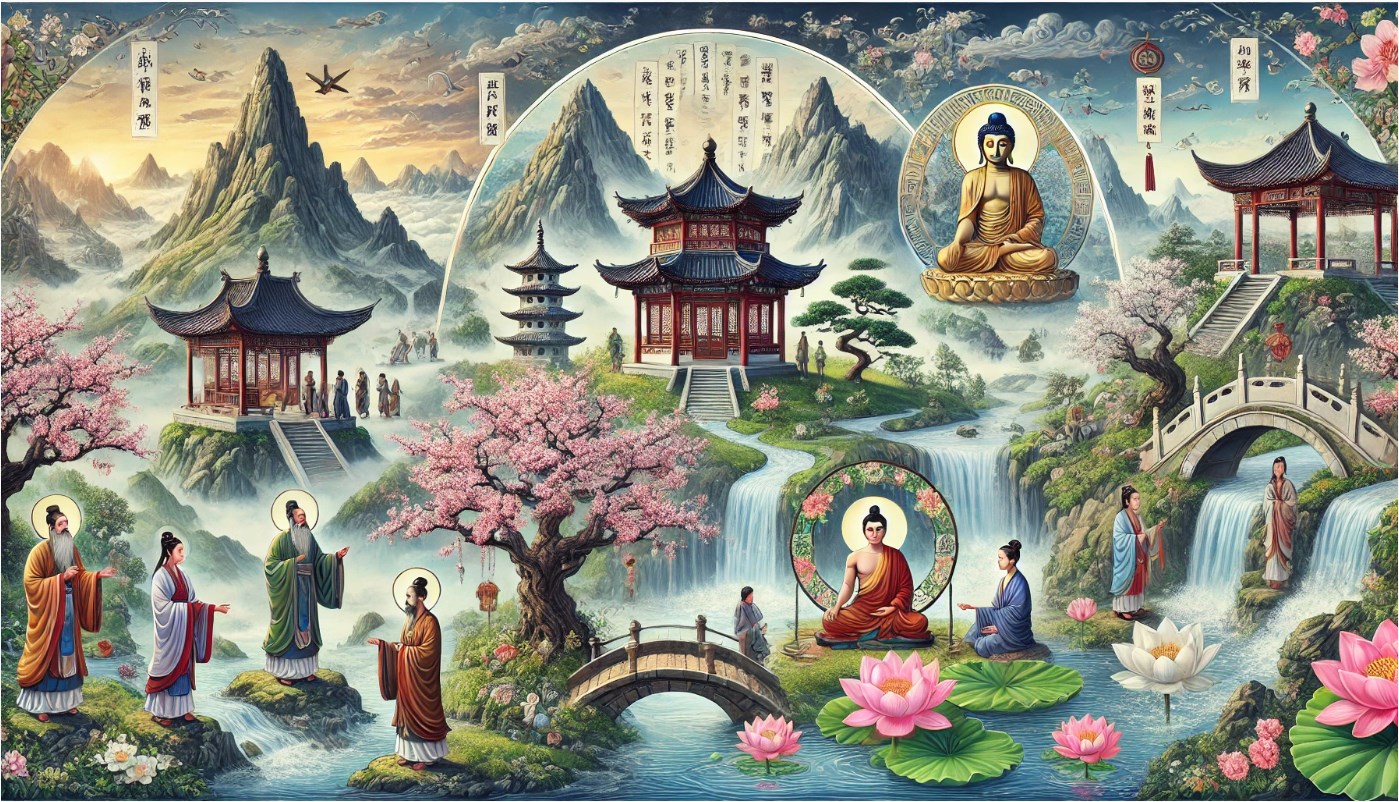Confucianism, founded by the philosopher Confucius (Kong Fuzi, 551-479 BCE), has been one of the most influential schools of thought in China for over two millennia. As a moral, ethical, and political philosophy, Confucianism permeates nearly every aspect of Chinese society, from its family structure and education system to its government policies and social norms. Rooted in the ideals of respect for authority, the importance of social harmony, and the cultivation of virtue, Confucianism has significantly shaped not only China’s historical trajectory but also the broader East Asian cultural and philosophical landscape.
At its core, Confucianism emphasizes the cultivation of virtue, the importance of family and social relationships, and the need for benevolent governance. The key concepts include ren (仁) or humaneness, li (礼) or ritual propriety, xiao (孝) or filial piety, and zhi (智) or wisdom. These ideas provide a framework for how individuals should behave, how families should function, and how rulers should govern.
While Confucianism has undergone various adaptations and reforms throughout Chinese history, its enduring legacy remains deeply embedded in the cultural fabric of China.
The Foundational Principles of Confucianism
Ren (仁) – Humaneness and Compassion
At the heart of Confucian ethics is ren, often translated as “humaneness” or “benevolence.” This concept refers to the ideal state of moral perfection that a person should aspire to achieve. It involves being compassionate, kind, and respectful towards others. Confucius taught that a truly virtuous person is someone who cultivates a deep concern for the well-being of others, making ren the central virtue in Confucianism.
- The Golden Rule: Ren can be seen as the Chinese equivalent of the Golden Rule, encapsulated in Confucius’ famous saying, “Do not do unto others what you do not want done to yourself.” This principle of mutual respect and empathy remains a cornerstone of Chinese social relations.
- Human Relationships: Confucius believed that the ideal person would naturally extend ren to all human relationships, particularly in family, friendships, and political interactions. A ruler with ren, for example, would govern with compassion, while a parent would nurture their child with care and love.
Li (礼) – Ritual and Social Harmony
Li refers to ritual, propriety, or etiquette, and is crucial to maintaining social harmony in Confucian thought. These rituals encompass not only formal religious ceremonies but also the everyday interactions between individuals. In Confucianism, the performance of appropriate rituals helps cultivate social order and respect. Li is not just about external actions, but also about internalizing the values of respect, sincerity, and humility.
- Social Order: The practice of li reinforces the structure of relationships in society. In Confucianism, each person is expected to adhere to specific roles and behave accordingly, whether as a child, parent, sibling, friend, teacher, or ruler. Proper conduct ensures that each relationship is harmonious and functional.
- Rituals in Governance: Li extends into governance, where rituals such as proper court behavior, ceremonies, and even the conduct of officials are viewed as key to maintaining order in society. A ruler who governs with li ensures that the state functions smoothly, and the people respect the laws and customs.
Xiao (孝) – Filial Piety
Xiao, or filial piety, is another central concept in Confucianism. It emphasizes the duty of children to respect, honor, and care for their parents and ancestors. Filial piety extends beyond mere obedience to include emotional and moral reverence for one’s parents and elders, as well as devotion to the family’s legacy.
- The Role of Family: In Confucian thought, the family is the foundation of society. Xiao is the foundation of personal ethics and social harmony. It is believed that a well-functioning family, where each member fulfills their role, will lead to a stable and prosperous society.
- Ancestral Worship: Filial piety also involves honoring one’s ancestors through rituals and offerings. This aspect of Confucianism underscores the importance of continuity between generations and the reverence of family lineage.
Zhi (智) – Wisdom and Moral Judgment
Zhi represents wisdom, specifically the ability to make good decisions in life. In Confucianism, wisdom is not simply intellectual knowledge, but the understanding of right and wrong, the discernment of what is appropriate in different social situations, and the ability to live virtuously.
- Virtuous Leadership: Wisdom is crucial for rulers. Confucius often stressed that a ruler must have both wisdom and virtue, as these qualities ensure good governance and maintain harmony in the state.
- Learning and Self-Cultivation: In Confucianism, wisdom is also tied to the continuous process of self-cultivation. Individuals are encouraged to engage in lifelong learning, reflection, and personal improvement.
Confucianism in Early Chinese History
The Role of Confucius and His Teachings
Confucius, born in 551 BCE during the Eastern Zhou Dynasty, is regarded as the founder of Confucianism. His ideas were shaped by the turbulence of the Spring and Autumn Period (770-476 BCE), a time of political fragmentation and social unrest in China. Confucius sought to restore order and harmony through the promotion of moral leadership and the cultivation of virtuous behavior among individuals and rulers.
- The Analects: The central text of Confucianism, the Analects of Confucius, is a collection of sayings and ideas attributed to Confucius and his disciples. It covers a wide range of topics, from personal ethics to government and social relationships.
- Confucius’ Vision of Governance: Confucius argued that the ruler must lead by example, practicing virtue and wisdom. He believed that people would follow virtuous leaders, thereby creating a harmonious society. The moral integrity of the ruler was seen as the key to a stable and prosperous state.
Confucianism and the Han Dynasty
Confucianism became state philosophy during the Han Dynasty (206 BCE – 220 CE), where it was adopted as the official ideology of the imperial court. The Han Emperor Emperor Wu (141–87 BCE) made Confucianism the foundation of the imperial examination system, which was used to select government officials. This marked the beginning of Confucianism’s formal integration into Chinese governance.
- The Civil Service System: The Han Dynasty established a merit-based civil service system, where candidates were selected based on their knowledge of Confucian texts. This system remained in place for over two thousand years, shaping China’s bureaucracy and educational institutions.
- Confucian Classics: During the Han period, the government promoted the study of Confucian classics, such as the Five Classics and the Four Books, which became central to education and the cultivation of virtuous leaders.
Confucianism’s Evolution and Influence in Imperial China
Confucianism During the Tang and Song Dynasties
Although Confucianism was deeply embedded in Chinese society by the time of the Tang Dynasty (618-907), the Tang rulers also incorporated elements of Buddhism and Daoism into state policy. However, by the Song Dynasty (960-1279), Confucianism underwent a revival, particularly through the work of scholars like Zhu Xi, who developed Neo-Confucianism.
- Neo-Confucianism: Zhu Xi’s Neo-Confucianism synthesized Confucian teachings with Daoist metaphysics and Buddhist insights. It emphasized self-cultivation, moral philosophy, and the cultivation of virtue. This philosophical school influenced both the intellectual elite and the state apparatus.
- Education and Social Structure: Confucianism continued to dominate the educational system, with a focus on moral development and scholarship. Scholars who passed the imperial exams were highly respected in society, and Confucian values remained integral to the imperial court’s functioning.
Confucianism and the Ming and Qing Dynasties
During the Ming (1368–1644) and Qing (1644–1912) Dynasties, Confucianism remained the dominant ideological force in China. The imperial examination system reached its peak, and Confucian ideals were deeply embedded in both the governance of the state and the daily lives of the people.
- Social Hierarchy and Patriarchy: Confucianism reinforced social hierarchies, including the patriarchal family structure, where the father held supreme authority. The ethical expectations of Confucianism created a rigid social order that was both respected and enforced.
- Cultural Continuity: Despite challenges such as the rise of foreign influence (particularly from the West) and internal rebellions, Confucianism remained resilient, continuing to shape the moral and political discourse in China.
Confucianism in Modern China
The Impact of Confucianism on the Chinese Communist Party
The rise of Marxism and the establishment of the People’s Republic of China in 1949 under the leadership of Mao Zedong marked a dramatic shift in Chinese society. Maoism, with its emphasis on class struggle and the rejection of traditional ideologies, sought to undermine Confucian thought. During the Cultural Revolution (1966-1976), Confucianism was denounced as a feudal ideology, and many Confucian texts and traditions were banned or destroyed.
- Cultural Revolution and Confucianism: Confucian values of hierarchy, obedience, and respect for authority were targeted during the Cultural Revolution. The government, led by Mao and the Red Guards, sought to eradicate Confucianism as part of the larger campaign to eliminate perceived class enemies and traditional culture.
However, after Mao’s death and the reforms initiated by Deng Xiaoping, there was a renewed interest in Confucianism, as many people in China began to look back at the nation’s past to restore a sense of cultural identity and social order.
Confucianism in Contemporary Chinese Society
In recent decades, Confucianism has experienced a resurgence in China, particularly under the leadership of Xi Jinping. The Chinese government has promoted Confucianism as part of the nation’s cultural revival, seeing it as a means to foster social harmony, strengthen national identity, and legitimize the current regime.
- Confucian Revival: In the 21st century, Confucian values are being actively incorporated into Chinese society through public education, media, and government policies. There is a push to reintroduce Confucian ideals of harmony, family values, and respect for authority in the context of modern economic development.
- Confucianism and Modern Governance: Xi Jinping has emphasized the role of Confucianism in fostering social stability and governance. He has stated that the principles of Confucianism align with the values of socialism with Chinese characteristics, and that Confucian teachings can help address the moral challenges facing contemporary China.
Confucianism’s Influence on Education and Society
Confucianism continues to have a profound impact on China’s education system, emphasizing self-discipline, respect for teachers, and lifelong learning. The traditional Confucian reverence for knowledge and scholarly achievement is still evident in the rigorous academic environment in Chinese schools and universities.
- The Role of Teachers: In Chinese society, teachers are highly respected, a reflection of Confucian ideals that place great importance on the role of educators in shaping the moral and intellectual development of students.
Confucian values also continue to shape family life, gender roles, and interpersonal relationships in contemporary China. The family remains the fundamental social unit, and filial piety is still strongly emphasized, although urbanization and globalization are challenging some traditional practices.
Confucianism’s Global Influence
Although Confucianism originated in China, its influence extends beyond its borders. In countries like Korea, Japan, and Vietnam, Confucianism has left a deep imprint on social structures, family dynamics, and educational systems. The Confucian emphasis on education, respect for elders, and social harmony has influenced the development of these nations’ cultures and governance.
In the modern era, the Confucian revival is not limited to China. Confucian principles are being rediscovered and reinterpreted in many parts of the world as people seek alternative approaches to individualism and social fragmentation. With its emphasis on moral integrity, respect, and communal values, Confucianism offers a framework for addressing contemporary social challenges, both within China and globally.







